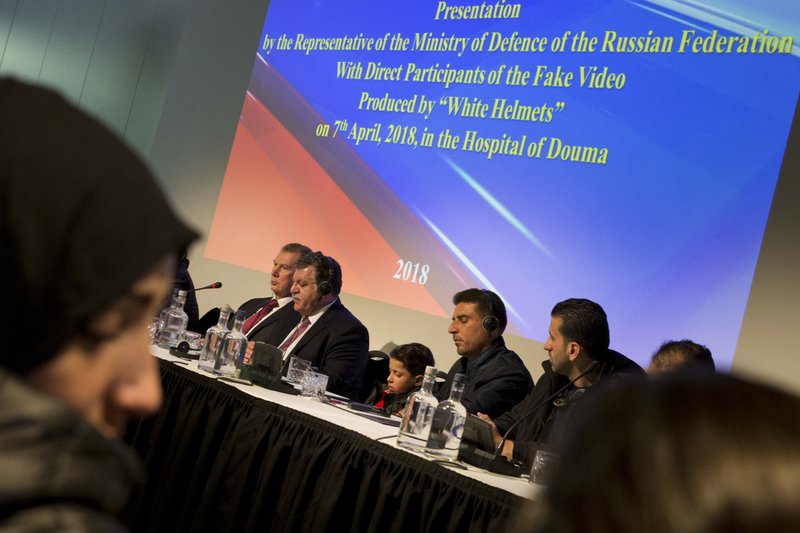THE HAGUE, Netherlands -- Russia ratcheted up its efforts Thursday to try to disprove that a Syrian town was hit by a poison gas attack, taking a group of Syrians, including an 11-year-old boy, to the global chemical weapons watchdog's headquarters to denounce the reports as fake.
The U.S., Britain, France and their allies boycotted the event at the Organization for the Prohibition of Chemical Weapons, branding it as "nothing more than a crude propaganda exercise" and an "obscene masquerade."
The Syrians were flown to Europe to tell their stories before the chemical-weapons watchdog and then ushered into a roomful of reporters at a nearby hotel where they all repeated nearly identical accounts: There was no chemical attack in Douma, near Damascus, on April 7. Patients who visited the hospital suffering from asphyxiation had inhaled only smoke and dust. There were no chemical traces or smells. Panic was sparked when first responders entered the hospital and began yelling that chemical weapons had been used.
One of them told reporters that the Syrians were in The Hague of their own free will and had not been put under any pressure.
The insistence by Russia and Syria that the chemical weapons attack was staged runs counter to witnesses and survivors interviewed by The Associated Press, some of them in Douma, who described being overwhelmed by a strong smell of chlorine.
The survivors interviewed by the AP in Douma after government forces took control of the town blamed rebels from the Army of Islam group of being behind the attack.
Other survivors who left Douma said the chlorine attack occurred amid government airstrikes and blamed the government of Syrian President Bashar Assad.
The chemical-weapons watchdog sent inspectors to Syria to investigate what happened. The team is not mandated to apportion blame.
The U.S., Britain and France launched airstrikes April 14 on suspected Syrian chemical weapons facilities.
Russia has accused the Syrian opposition and its first responders, known as the White Helmets, of fabricating videos of a chemical-weapons attack to frame the government.
After a sarin gas attack in the northern town of Khan Sheikhoun last year, Russia dismissed U.N. accusations that the Syrian government was responsible and said photos and videos made by the White Helmets at the site show them without proper protective gear -- an indication the attack was a fabrication. A joint investigation by the U.N. and chemical-weapons watchdog, however, blamed Syria for the attack.
Russia has never before gone to the lengths it did Thursday, including taking Syrians to Europe to back its claims.
The youngest participant was 11-year-old Hassan Diab, who was seen on video after the Douma attack being doused with water in a hospital.
With little more than his head and shoulders visible above the table, he looked healthy if slightly bewildered as he briefly recounted what happened to him before returning to sit with his mother in the front row of the audience, starting to fidget and walk around during the lengthy news conference.
"We were in the basement; we heard cries on the street that we should go to the hospital. We got scared. We went to the hospital through the tunnel," he said, largely echoing what his father had said before him. "They started pouring water on me at the hospital. I don't know why. After that they took me to a different place. Thank you."
Russian Ambassador Alexander Shulgin defended taking the child to The Hague.
"Little Hassan is an eyewitness today, an extremely important witness," Shulgin said, speaking through an interpreter. "He's proving -- an innocent child -- he's telling the truth. You know that out of the baby's mouth comes the truth, and today that truth you don't want to hear."
Shulgin said Russia has been accused repeatedly of spreading fake news.
"After this briefing, no one would have a shadow of a doubt who distributes fake news and who is waging an information war," he added.
The United States and its allies were not convinced.
"The authenticity of the information gathered to date on the chemical attacks that occurred in Douma on 7 April, through numerous testimonies, is unassailable," the nations said in a statement.
"Medical NGOs have found traces of chemical agents on the victims. Photographs and videos, numerous and mutually reinforcing, have been authenticated. The symptoms of more than 500 patients who presented on the same day of the attack in health care facilities undoubtedly corresponded to gas intoxication," the statement said.
Britain's ambassador, Peter Wilson, said he and other Western allies refused to attend the briefing.
"This obscene masquerade does not come as a surprise from the Syrian government, which has massacred and gassed its own people for the last seven years," said France's ambassador to the Netherlands, Philippe Lalliot.
Inside Syria, government forces on Thursday pushed into a Damascus neighborhood held by Islamic State militants from different directions, capturing buildings and tunnels used by the extremists, state media reported.
The Syrian Arab News Agency said dozens of Islamic State fighters were killed in battles in the southern Damascus neighborhood of Hajar al-Aswad, where ground troops closely coordinated airstrikes with the air force.
The weeklong fighting in Hajar al-Aswad and the nearby Palestinian refugee camp of Yarmouk has killed dozens of people. The area is the last district not in government control in Damascus, and its capture would boost security in Assad's seat of power.
Information for this article was contributed by Bassem Mroue and Zeina Karam of The Associated Press.
A Section on 04/27/2018
